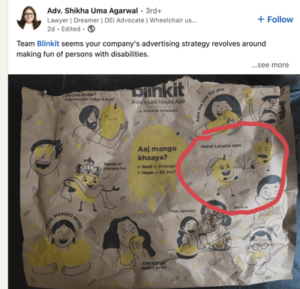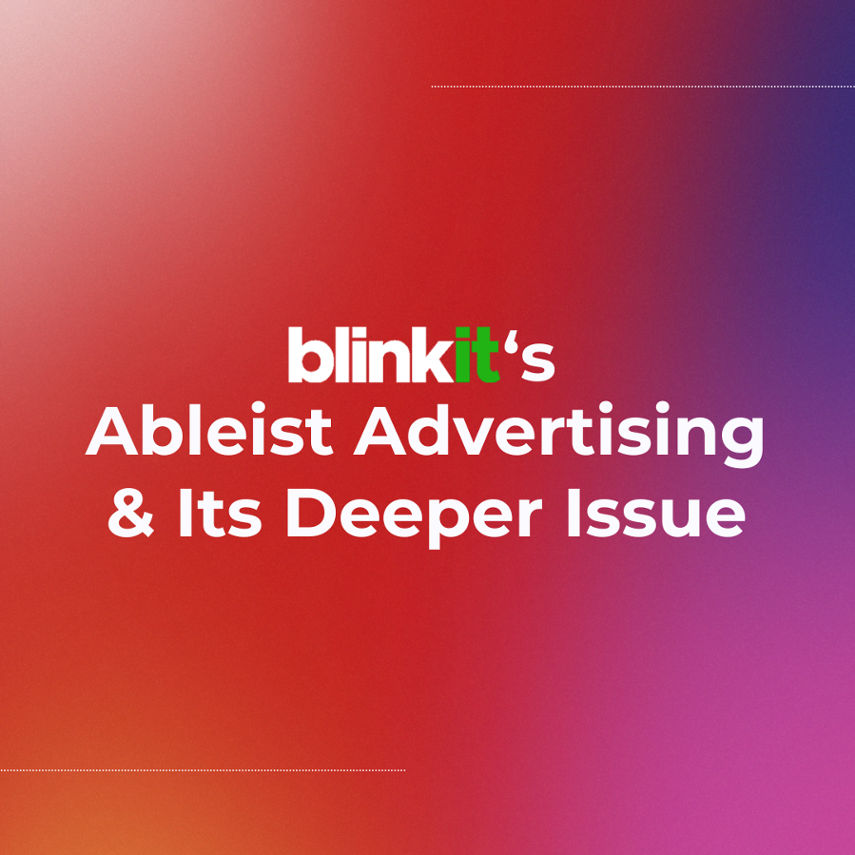CATEGORIES
#Branded #Entrepreneurial Mindset #Social ImpactOverview:
- An introduction to ‘Blinkit’ and the ableist advertisement controversy.
- Contextualizing ‘Langda’ and the ‘Langda Aam’.
- A perspective on the culture of ableism that the controversy inadvertently shone light to.
- Summarizing India’s legislative framework around disability.
Blink Commerce Private Limited (formerly known as Grofers India Private Limited) is an e-commerce platform for groceries headquartered in Gurgaon, Haryana, India going as ‘Blinkit’. It was founded in 2013 but underwent a strategic rebranding in light of the exponential demand for quick-commerce. Blinkit, now a wholly owned subsidiary of Zomato, achieves success in commerce. It does so by setting up dark stores at multiple locations across cities and delivering groceries within 15 minutes.
Recently, a lawyer (who is a wheelchair user) took to LinkedIn to question Blinkit’s problematic sense of humor. She recounts how she noticed the advertisement art on Blinkit’s packaging, which included an ableist statement disguised as a “joke”. The art depicts two mangoes with human arms and legs; one is mocking the other with a “Hehe! Langda Aam”.

The Context For the ‘Langda’ Aam Ad
India relishes its rich variety of fruits, but a general favorite across the country is the mango, or ‘aam’. There is no other apt description for a mango, except that it is delectable. As the leading producer of mangoes, India produces several cultivars. The individual mango cultivars are so distinctive in their region of origin, color, size, and flavor that several have been granted Geographical Indication tags. Most famously, these cultivars include Maharashtra’s Hapus (or Alphonso), Karnataka’s Totapuri, Gujarat’s Gir Kesar, Himachal’s Chausa, and Uttar Pradesh’s Langda.

Blinkit’s Inappropriate (Ableist) Wordplay of ‘Langda’
‘Langda’ is a Hindi term for a person who cannot use one or both of their legs. It is used in a similar sense to the English word ‘lame’. Blinkit’s ableist advertisement makes an unwelcome spin on the word ‘Langda’. Given the context, it can refer to a cultivar of mango or a person with a disability. The illustration of one ‘able-bodied’ mango mocking the other mango for its disability is deeply insensitive towards the disabled community. Unfortunately, the ableist advertisement only goes to show precisely what the general public’s stance is with respect to the disabled community.
As with most languages, terms used to describe disabilities are often hurled as slurs and used demeaningly. The term ‘Langda’ is, similarly, used to simply refer to someone inept or incapable (irrespective of whether or not they are disabled). In fact, ‘Langda’ is so culturally absorbed that a common children’s game called ‘Langdi’ has emerged from it. In the game, the tagger folds up a leg and hops around on the other while chasing other players.
Why the Controversy Is Larger Than Itself
Given how large the population of India is, even some marginalized groups can be quite populous, including the disabled community. According to the Office of Chief Commissioner for Persons with Disabilities, persons with disabilities made up around 2.1% of its total population as of 2021. This figure is admittedly a little wonky, given that it is not inclusive in the least.
India’s Rights of Persons with Disabilities Act, 2016 limits the understanding of disabilities in two ways. Firstly, it restricts the scope of the term ‘disabilities’ to only include those listed in the Schedule annexed therein under the ambit of the Act. Secondly, it lays down a “benchmark” qualification for disabilities: one’s overall functionality must be hampered by their disability upwards of 40%. As a result, in reality, only having a certificate of disability allows persons with disabilities to exercise their rights in a bare minimum manner.
This effectively excludes every other form of unlisted disability from receiving the medical help or accommodation it may necessitate. When a legislature refuses to acknowledge a notion, society is bound to not treat the notion with the respect it might deserve. Resultantly, medical conditions such as hyperhidrosis are not considered to be “true” disabilities by society and the medical fraternity alike. And yet, they can severely hamper people from daily tasks involving the usage of hands. This is clearly in violation of India’s fundamental rights such as the right to equality, equal opportunities, and to live a dignified life. The reluctance of the country’s legislature to accommodate persons with disabilities is reflective of the Indian society’s rejection of the disabled community.

Parting Shot
‘Langda’ is so commonly and apathetically used that no one seemed to bat an eye at the ableist advertisement. It took someone from the disabled community to voice displeasure for this matter to even come to the forefront. Even so, the media has yet to give this issue the attention it calls for, and so, it remains vastly out of the general public’s knowledge. Blinkit’s ‘Langda Aam’ is an ableist advertisement and a pointed marketing strategy. It disregards and disrespects the section of their consumer base that is part of the disabled community.
Conclusion
Blinkit’s advertising sheds light on deeper societal issues concerning ableism and the treatment of individuals with disabilities. The insensitive wordplay not only reflects a lack of sensitivity but also highlights broader systemic challenges in India’s understanding and inclusion of disabilities. This incident underscores the importance of fostering greater awareness and sensitivity towards marginalized communities within both corporate advertising and societal attitudes.


